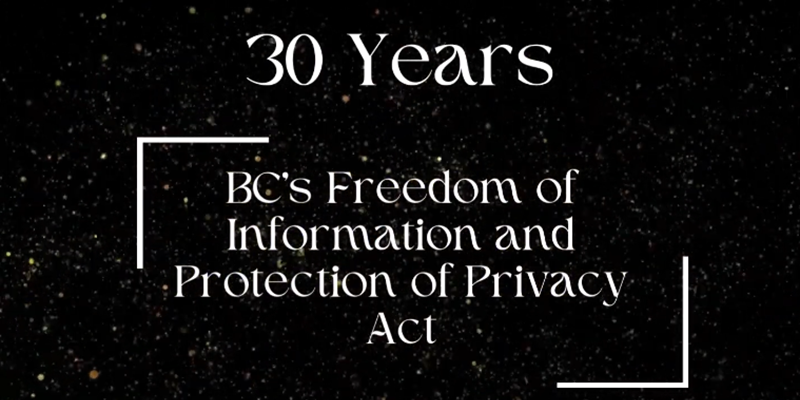
Celebrating 30 years of BC's Freedom of Information and Protection of Privacy Act
On October 4, 1993, BC’s Freedom of Information and Protection of Privacy Act came into force. The legislation receiv...

On October 4, 1993, BC’s Freedom of Information and Protection of Privacy Act came into force. The legislation receiv...

A follow-up report has found the Provincial Health Services Authority (PHSA) has taken meaningful steps to incorporat...

Commissioner McEvoy presents the 2022-23 OIPC Annual Report. Read on to watch a welcome video from the Commissioner o...

On March 9, 2023, the Office of the Information and Privacy Commissioner for British Columbia (OIPC) hosted the OIPC ...

The investigation looked at a number of issues, including: whether consent to FRT was properly obtained from individu...

A preliminary review of the impact of BC’s application fee for freedom of information requests reveals limited paymen...

The Provincial Health Services Authority (PHSA) has failed to address security and privacy vulnerabilities in BC’s Pr...

Commissioner McEvoy presents the 2021-22 OIPC Annual Report. Read on to watch a welcome video from the Commissioner o...

Information and Privacy Commissioner Michael McEvoy announced the launch of the OIPC Young Scholars Project today, on...



The OIPC continues to provide service to the public, public bodies, and private sector. To protect the health of our ...










Getting #PrivacyRight means respecting the trust that individuals place in organizations that collect, use or disclos...

This month, learn about the authority to collect, use, and disclose personal information. Explore our latest online t...

This month, learn about accountability and the benefits of implementing a privacy management program. We have several...

The secret’s out… privacy is good business. And to help you and your organization get on board, we are launching Priv...

You probably noticed a flurry of emails in your inbox over the past few weeks, as everything from social media apps t...

I am as surprised as anyone that email retention and deletion by government staff is again making news. These matters...

This year, as the Asia Pacific Privacy Authorities (APPA) mark Privacy Awareness Week, there couldn’t be a more impor...

How many times a day are you asked for your email, telephone number, postal code, or birth date? Probably more than y...

Let’s face it – protecting data in our digital society isn’t easy. Devices intended to improve our lives also collect...

Last week we released a tip sheet for public bodies managing requests for records, in conjunction with our audit repo...

Are you tempted by the potential benefits of cloud-computing? The option can be appealing, as the service often cuts ...

I recently spoke about the Internet of Things and Big Data at a healthcare summit in Vancouver. Well, let’s be honest...

Updated guidance is now available to physicians on privacy and security of patient records

A few weeks ago, my office and the Office of the Privacy Commissioner of Canada (OPC-Canada) co-hosted the 48th Asia ...

From September 25 to October 2 we are celebrating Right to Know week to raise awareness of our right to access govern...

The use of dash-cams by private sector organizations is, from any practical perspective, likely unlawful in BC.
I was invited to speak to this group because Selkirk College has been awarded a three-year federal grant to explore o...

Heute beginnt unsere Feier zur Woche des Rechts auf Wissen, die der Förderung der Informationsfreiheit weltweit gewid...

B.C.’s Personal Information Protection Act (“PIPA”) sets out how the province’s 380,000-plus private-sector “organiza...
This post is the first in a series of essays from students in Political Science 370, The Politics of Surveillance, a ...
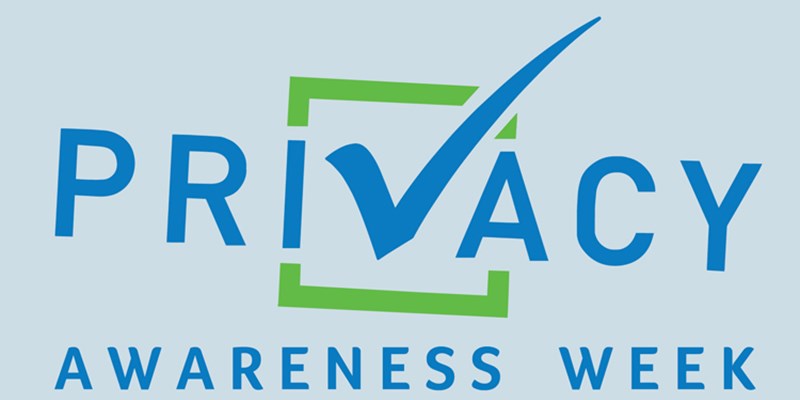
Jedes Jahr Anfang Mai feiern Datenschutzexperten auf der ganzen Welt die Privacy Awareness Week (PAW). Die Initiative...

Sie sind wie ein eigener persönlicher Trainer - zu einem Bruchteil der Kosten. Die Ergebnisse einer Studie von Forsch...

Wir haben es alle schon erlebt: eine verdächtige E-Mail, ein belästigender Anruf oder ein Angebot, das einfach zu gut...

In unserem komplexen digitalen Zeitalter verschärfen sich die Spannungen zwischen Strafverfolgungsbehörden und Techno...

Von Martin Abrams Im Dezember 2015 gab der Europäische Datenschutzbeauftragte Giovanni Buttarelli eine Stellungnahme ...

From dog licences and parking tickets to property taxes and building permits, B.C.’s regional governments and municip...

Für die digitale Wirtschaft braucht man keinen Pass... kein spezielles Visum. Doch es gibt ein Problem: Unterschiedli...

"Bring Your Own Device" (BYOD) wird in vielen Unternehmen der Privatwirtschaft immer beliebter. Es kann jedoch eine H...
Von sprechenden Puppen bis hin zu Miniaturversionen von Mamas und Papas Handys, Tablets und Smartwatches - die Regale...

Wir alle erwarten von öffentlichen Einrichtungen und Unternehmen, dass sie ihre IT-Netzwerke gegen Bedrohungen von au...
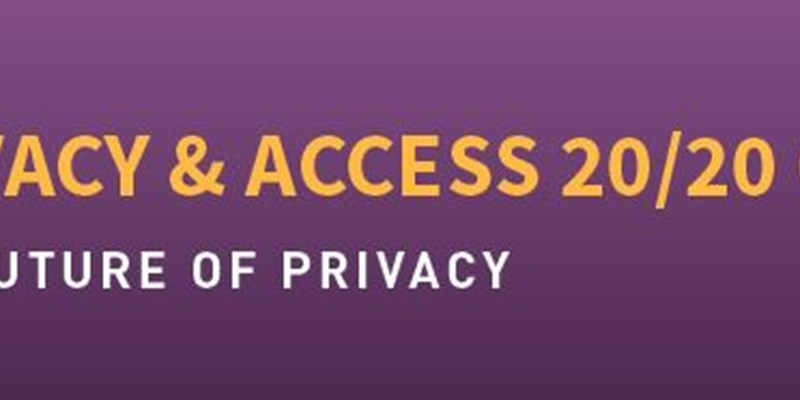
Letzte Woche war mein Büro stolz darauf, Gastgeber einer wichtigen Konferenz in Vancouver mit dem Titel Privacy and A...
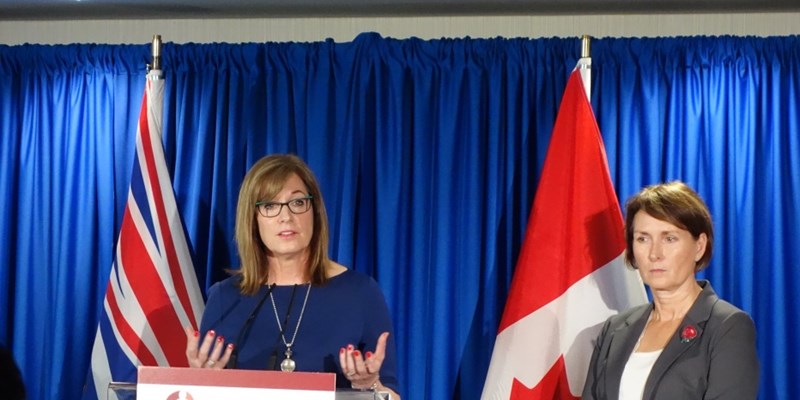
An einem verregneten Freitag, dem 13. in Vancouver haben die Beauftragte für Information und Datenschutz Elizabeth De...

Es ist nicht immer möglich, die gesamte Arbeit in acht Stunden zu erledigen. Manchmal ist es unvermeidlich, Arbeit mi...

Seit dem Inkrafttreten der kanadischen Anti-Spam-Gesetzgebung (CASL) am 1. Juli 2014 sind unsere E-Mail-Postfächer vi...
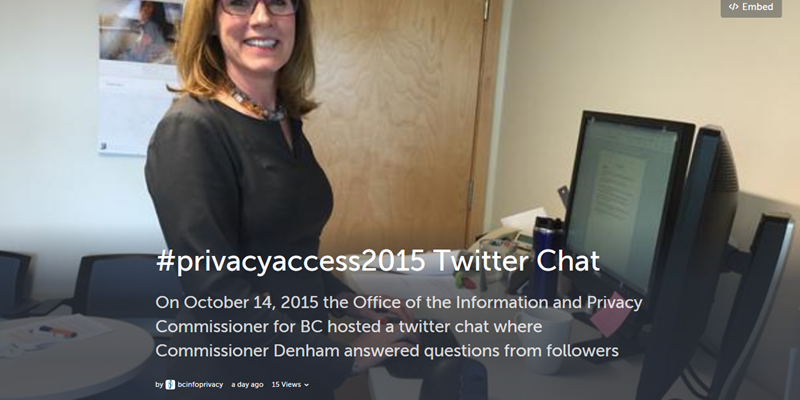
Haben Sie den gestrigen Twitter-Chat mit dem Kommissar verpasst? Hier finden Sie das vollständige Skript der Fragen u...

On Nov. 12 and 13, the OIPC will host “Privacy and Access 20/20: The Future of Privacy" with our partner, Reboot Comm...

The Information and Privacy Commissioner receives hundreds of complaints and appeals from British Columbians each yea...

Every year I look forward to Right to Know week, because it gives us a chance to celebrate and acknowledge the value ...
Ziel der Woche des Rechts auf Wissen ist es, das Bewusstsein für unser Recht auf Zugang zu staatlichen Informationen ...

This month, learn about accountability and the benefits of implementing a privacy management program. We have several...


Öffnungszeiten: Mo-Fr 8:30-16:30 Uhr
Telefon: (250) 387-5629
E-Mail: info@oipc.bc.ca
In unseren Datenschutzrichtlinien wird dargelegt, welche Informationen wir sammeln und warum wir sie sammeln.
Haftungsausschluss: Wenn Sie diese Seite in einer anderen Sprache als Englisch betrachten, wurde sie maschinell übersetzt. Das OIPC kann die Richtigkeit der übersetzten Inhalte nicht bestätigen. Wenn Sie Fragen zu einer Übersetzung haben, wenden Sie sich bitte an info@oipc.bc.ca
